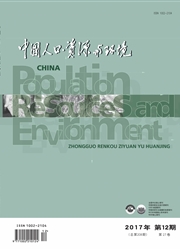

 中文摘要:
中文摘要:
新世纪以来,伴随着劳动力的大规模外流,农村公共事务治理呈现出集体经济困难、人居环境恶化和农田水利废弛等各个方面全面衰败的景象。灌溉作为农村典型的公共事务,对于从微观层面揭示劳动力大规模外流与农村公共事务治理衰败之间的因果关系具有代表性意义。关于劳动力流动对农村公共事务治理的影响,在已有的实证研究文献中鲜有讨论。本文基于2014年清华大学中国农村研究院对全国21个省份的调查数据,建立二元logistic回归模型,对1 507个农户的灌溉行为进行计量分析,发现农户家庭劳动力外流对农户参与集体灌溉具有显著的负面影响。这表明,在快速城镇化的过程中,劳动力外流为经济增长做出贡献的同时,也弱化了农村集体行动能力,对农村公共事务治理产生了显著负面影响。同时,计量结果表明:平原地区、水资源自然条件一般的村庄、耕地位于灌渠的中游、农户的承包地经营面积较大、农户的承包地块数较多、灌溉对农户家庭收入的重要性较大以及村庄对私自挖渠取水有惩罚措施等变量对农户参与集体灌溉有显著的正面影响;村庄位于城市郊区、地区经济发展水平较高和灌溉缺水历史等变量对农户参与集体灌溉有显著的负面影响;用水户协会的有无对农户是否参与集体灌溉没有显著的影响,原因是中国农村大多数用水户协会是行政力量推动下的产物,实际作用并不明显。上述结果表明:近20年来的大规模劳动力流动为中国经济高速增长做出贡献的同时,给农村公共事务的治理带来显著的不利影响。研究大规模劳动力流动背景下的农村公共事务挑战及其应对,具有重要的理论价值和实践意义,应作为未来重要的学术方向。由于农村劳动力外流是难以逆转的发展趋势,如何培育新的历史条件下的合作资源,实现农村社会有效的集体行动?
 英文摘要:
英文摘要:
Since the new century,the governance of rural public affairs has exhibited various aspects of breakdowns such as troubled collective economy,deterioration of the living environment and the decline of farmland water conservancy,accompanied by the mass out-migration of labor. Irrigation as typical rural public affairs,has a representative significance to reveal the causality between mass out-migration of labor and the decline of rural public affairs governance at the micro-level. With regard to the impact of labor migration on the governance of rural public affairs,prior empirical literature rarely discussed. Based on the 2014 survey data from 21 provinces by China Institute for rural studies in Tsinghua University,an econometric analysis of 1 507 households ’irrigation behavior was conducted through building a binary logistic regression model. We found that labor outflow of rural households has a significant negative effect on farmers to engage in collective irrigation. This suggests that in the process of rapid urbanization,labor migration not only contributed to economic growth,but also weakened the capacity of rural collective action,and then had a negative impact on the governance of rural public affairs. At the same time,the econometric results show that: plain,moderate water scarcity,middle distance to public irrigation,larger & more dispersed farmland,greater importance of irrigation for household’s income and penalties for unauthorized digging trenches all have a significant positive impact on whether or not the farmers participate in collective irrigation.However,suburban,higher level of regional economic development and frequent irrigation shortage all have a significant negative impact on whether or not the farmers participate in collective irrigation. The existence of Water Use Association( WUA) does not have a significant impact on whether or not the farmers participate in collective irrigation; the reason is that the establishment of most WUAs in rural China is driven by the executive pow
 同期刊论文项目
同期刊论文项目
 同项目期刊论文
同项目期刊论文
 期刊信息
期刊信息
